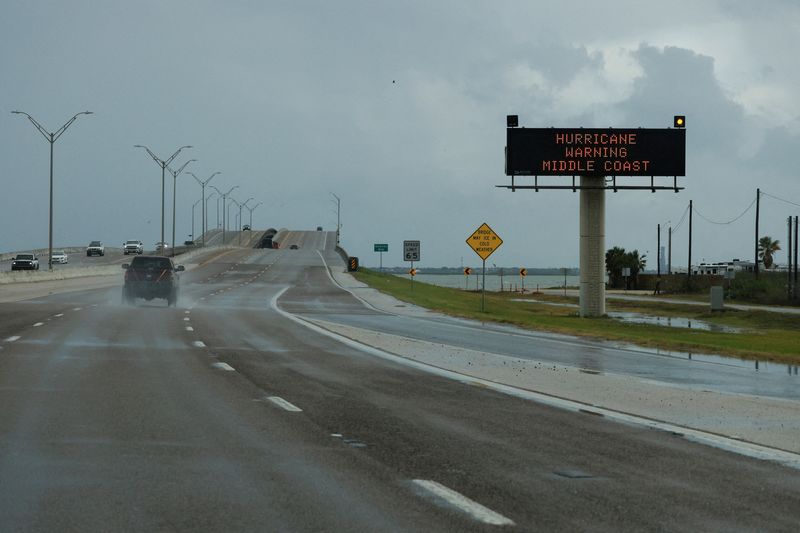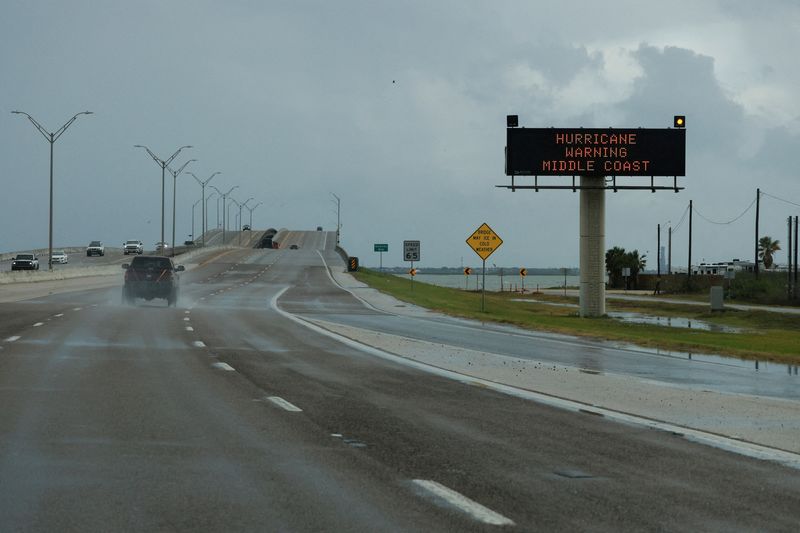
By Erwin Seba and Arathy Somasekhar
HOUSTON (Reuters) -The Texas energy industry braced for Hurricane Beryl’s impact on Monday as the powerful storm lashed the U.S. Gulf Coast and closed key shipping ports, slowed refining and prompted evacuations of some offshore production sites.
Beryl made landfall near the coastal town of Matagorda, Texas, on Monday morning, packing maximum sustained winds of 80 miles per hour (129 kilometers an hour) and posing problems for the heart of the country’s energy sector.
The storm had strengthened to a Category 1 hurricane before landfall but was downgraded to a tropical storm mid-morning and expected to weaken throughout the day. It is forecast to move across eastern Texas and into the Lower Mississippi Valley and Ohio Valley later in the week, according to the U.S. National Hurricane Center (NHC).
Texas is the largest U.S. oil and gas producing state, accounting for some 40% of oil output and 20% of gas production.
U.S. crude futures were down about 52 cents on Monday to $82.64 a barrel, as hopes of a ceasefire deal in Gaza eased global supply concerns and capped gains driven by storm-related disruptions.
U.S. fuel futures were also trading lower as major refineries along the Gulf Coast so far appeared to see minimal impacts from the storm.
“Since the storm has threaded the needle between the two major production hubs in Corpus Christi and Houston, it seems that the threat of regional supply disruptions has passed,” said fuel marketer TAC Energy, noting that only Phillips 66 (NYSE:PSX)’s Sweeny, Texas, facility was in the immediate path of the storm.
Phillips 66 said it was still assessing its operations following the storm.
More than 2.5 million homes and business in Texas were without power midday on Monday, according to PowerOutage.us. CenterPoint Energy (NYSE:CNP), which provides power to the southern and eastern parts of the state, had at least 2.1 million customers without electricity, the company said.
Flash flood warnings were issued for several counties in southeastern Texas including in Houston, where many U.S. energy companies are headquartered, due to thunderstorms producing up to six inches of rain, with two to four more inches expected.
Heavy winds lashed Houston on Monday morning as streets and waterways flooded, according to a Reuters witness and images on social media.
At least two people had died in the Houston area as a result of the storm, according to Harris County Sheriff Ed Gonzalez.
ENERGY INDUSTRY HIT
Over the weekend, the Port of Corpus Christi, the country’s leading crude oil export hub, closed operations and vessel traffic in preparation for Beryl. The ports of Houston, Galveston, Freeport and Texas City were also shut ahead of the storm’s landfall.
Enbridge (NYSE:ENB) Inc, which runs crude oil export facilities near Corpus Christi, said it had activated emergency plans for assets along or near the U.S. Gulf Coast.
Shell (LON:SHEL) and Chevron (NYSE:CVX) said they had shut production or evacuated personnel from their Gulf of Mexico offshore platforms. The U.S. Gulf of Mexico produces some 1.8 million barrels per day of oil, roughly 14% of total U.S. output. It was not immediately clear how much production had been shut-in as a result of Beryl.
Freeport LNG, the third largest liquefied natural gas facility in the U.S., said over the weekend it had ramped down production and would resume operations after the storm had passed.
Formosa Plastics, meanwhile, experienced a malfunction with a gas compressor system during a shutdown for the storm at its Point Comfort facility, according to a state regulatory filing. The company did not immediately respond to a request for comment.
Refiner Citgo Petroleum Corp reduced production over the weekend at its 165,000 barrel-per-day Corpus Christi, Texas, plant, sources said.
Marathon Petroleum (NYSE:MPC), meanwhile, said it had comprehensive plans in place to protect staff, assets and communities during severe weather, but declined to comment on its 585,000-bpd Galveston Bay refinery operations.

Chevron said it had hurricane preparation procedures in place to ensure safe operations at its Pasadena refinery southeast of Houston, but otherwise did not comment on operations at the plant.
LyondellBasell declined to comment on the status of its 268,000-bpd Houston refinery.
This post is originally published on INVESTING.




